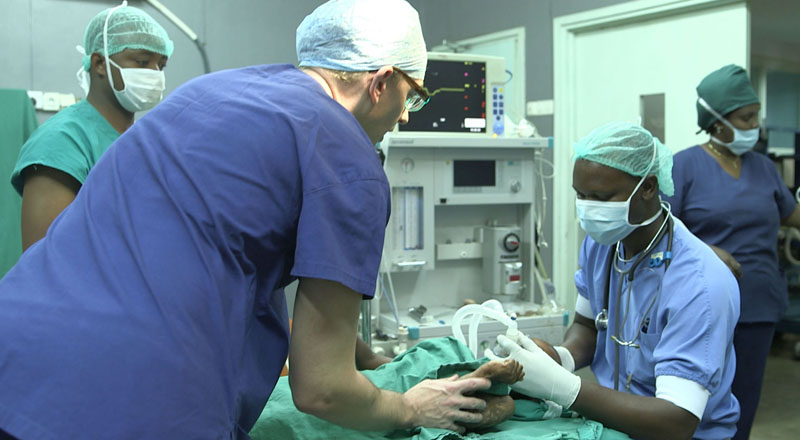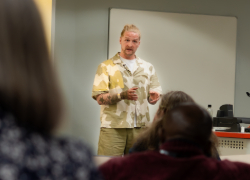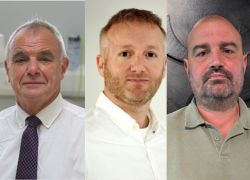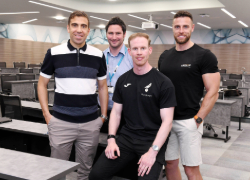NHS charitable work in Tanzania documented by Teesside team
Pioneering work by North-East medics to train their counterparts in Tanzania is being documented by filmmakers from Teesside University.

Dave McPhee and Dominic Dunn from Teesside University’s Aurora House Productions shadowed a clinical team from Northumbria Healthcare NHS Foundation Trust when they visited the East African country to teach the latest keyhole surgery techniques.
The pair filmed more than 25 hours of footage which they are in the process of editing into a 90-minute documentary which they hope to complete this spring.
The film sets out to capture the achievements of a 17-year partnership between Kilimanjaro Christian Medical Centre in northern Tanzania and Northumbria Healthcare, one of the UK’s leading NHS trusts.
The documentary looks at the people who drive the projects forward, as well as the disparity in resources and equipment between the British and Tanzanian clinical teams, while emphasising how they are both motivated by a desire to provide the best possible care for their patients.
Aurora House Productions is a video production company which operates within the School of Arts & Media and provides a range of specialist services to businesses as part of The Forge, the University’s business hub.
Aurora House had previously worked with Bright Northumbria, the NHS trust’s charitable arm, to produce a short film in 2010 about a unique internet-based training system used to develop laparoscopic surgery at Kilimanjaro Christian Medical Centre (KCMC) in Tanzania.
This led to Dave and Dominic spending 10 days at KCMC recently as a team led by Liam Horgan, a laparoscopic surgeon from Northumbria, worked with the local surgeon Dr Kondo Chilonga at the hospital.
Whilst there, they were able to record the first-ever day case gallbladder surgery carried out in East Africa. Prior to the intervention by Mr Horgan and his colleagues, similar operations would have required open surgery necessitating weeks in hospital as the patient recuperated.
The new laparoscopic techniques mean that KCMC can drastically reduce its waiting times for operations, free up much-needed bed space and by reducing the time spent in hospital, significantly decrease the risk of infection.
The documentary will also look at the work done to develop plastic surgery techniques and care for burns victims at KCMC, following the work of consultant surgeon Jeremy Rawlins who leads a separate project team.
Dave McPhee, creative director at Aurora House, said: 'Travelling to Tanzania and filming for this documentary was a real eye-opener. We had extremely privileged access in the hospital.
'This is not going to be a film about western aid to Africa; this is about our doctors (completely out of their comfort zone) working in partnership with their doctors. It’s about ingenuity, collaboration and using the resources they can get out there to provide modern medicine.
'At first you see the over-crowding and the general state of the hospital, but then you see the incredible work and service the doctors and nurses are providing with so little. And you can see the strong friendships that have built up over the years of working together. This really comes out in the film.
'We want to create an observational documentary which looks at the fantastic work done by the clinical teams. There was so much going on that at times it was difficult to know when to stop filming.'
Once the documentary is complete, Dave and Dominic plan to show it at film festivals as well as pitch it to broadcasters to showcase the work of Bright Northumbria.
Brenda Longstaff, head of charity development and international partnerships at Northumbria Healthcare, said: 'It has been a privilege to work with KCMC. Sometimes we are in complete awe of what they are able to do with so little compared to the latest high-tech equipment we have in the NHS. I think we definitely learn a lot from each other.
'Over the years we have worked on a number of long-term projects which have transformed health services for the people of Tanzania. We have both been in this for the long haul, as it takes time to train people and launch new services such as laparoscopic surgery. It’s not something you can do in a few weeks. We have achieved this together, working as equals to overcome the odds and come up with the results. Best of all we have done this with people who have become great friends.'
Liam Horgan, consultant surgeon at Northumbria Healthcare, said: ‘When I first set off to volunteer in Tanzania in 2003 I had no idea that I would meet a surgeon, Dr Kondo, who would work with me on a project which would take over the next 13 years of our lives.
'It seems incredible looking back that we actually did it – introduced laparoscopic surgery to Tanzania, used tele-mentoring successfully and more recently introduced day case laparoscopic surgery – when the odds seems so much against us at times: lack of equipment, lack of understanding for what we wanted to do, and at times even lack of regular electricity. But we have done it and it was worth all of the effort and the years that have gone into training and developing relationships.
'It has transformed healthcare in Tanzania and I feel very privileged to have been part of it.'
 Teesside University raising aspirations for young people in
...
Teesside University raising aspirations for young people in
... Teesside University awards Honorary Doctorates to industry
...
Teesside University awards Honorary Doctorates to industry
... Alumni support elite football event
Alumni support elite football event